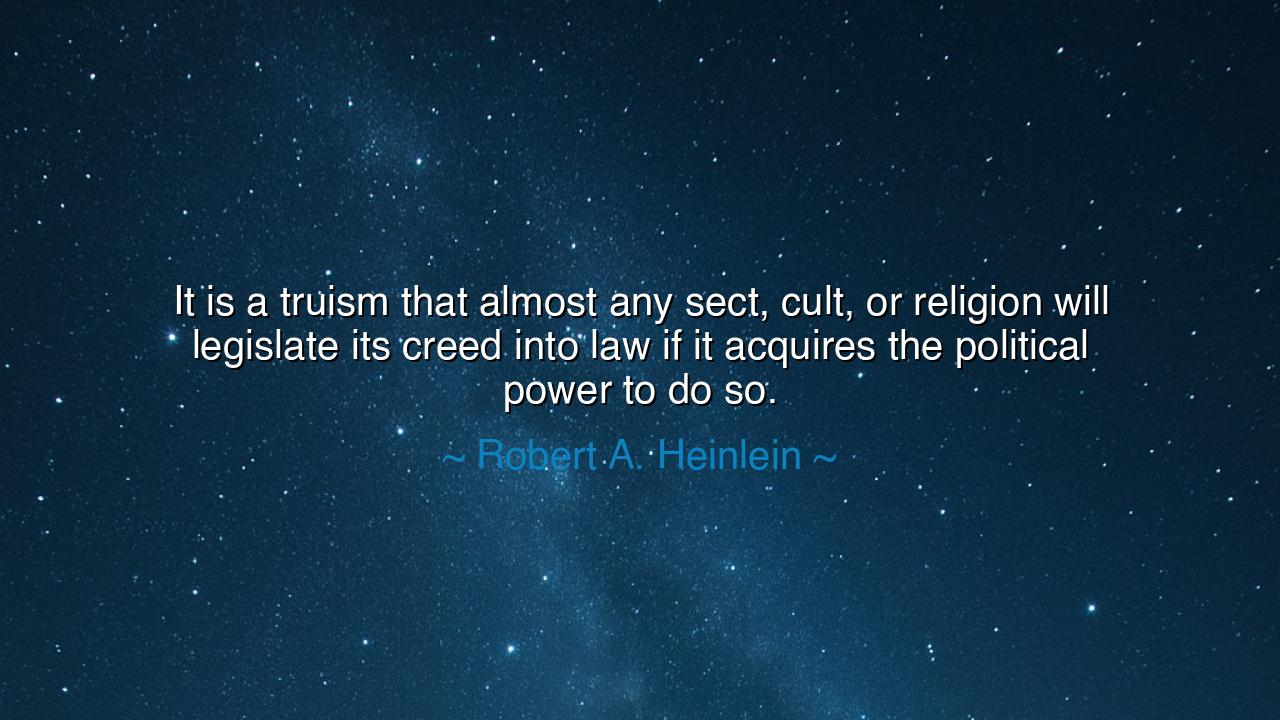
It is a truism that almost any sect, cult, or religion will
It is a truism that almost any sect, cult, or religion will legislate its creed into law if it acquires the political power to do so.






“It is a truism that almost any sect, cult, or religion will legislate its creed into law if it acquires the political power to do so.” – Robert A. Heinlein
In these words, Robert A. Heinlein, the visionary of the modern age, speaks with the clarity of a prophet observing the long arc of human history. He does not condemn faith, nor mock belief, but warns of the danger that arises when belief seeks to rule rather than to inspire. His statement is not born of cynicism but of witness — for across ages and empires, whenever the hand that governs wields the sword of doctrine, freedom perishes beneath its weight. Heinlein reminds us that when any creed — whether born of church, ideology, or faction — gains power, its first temptation is to make its truth the law of all. It is an ancient pattern, repeated as faithfully as the rising of the sun.
From the dawn of civilization, men have sought the divine, and from that longing arose religions and sects, each proclaiming its understanding of the sacred. Yet, when these sacred visions stepped beyond the temple and into the throne room, their purity often dimmed. The priests of Egypt, once keepers of cosmic harmony, became guardians of Pharaoh’s dominion. The Roman emperors, declaring themselves sons of gods, turned worship into empire. The Inquisition burned in the name of mercy, and crusades marched in the name of love. Each began in faith, but ended in fire. Heinlein, looking across this history, saw the pattern clearly: when power and belief unite without humility, they become a tyranny cloaked in holiness.
Consider the story of Galileo Galilei, who lifted his eyes to the heavens and saw that the Earth was not the center of all things. To him, this truth was revelation — a song of creation more wondrous than any dogma. Yet those who held religious power could not bear it. They feared that his truth would shake their order, so they chained him with threats and forced him to kneel before falsehood. It was not faith that condemned him, but the marriage of faith and authority. The creed had entered the courtroom; the pulpit had become the throne. Heinlein’s words echo through this tragedy like thunder: when belief gains the power to legislate, it will not rest until the world bends to its shape.
But let us not mistake his message for one of despair. There is wisdom in the warning. Heinlein calls us to vigilance, to guard the sacred flame of both faith and freedom — each noble, yet each diminished when they consume the other. The ancients spoke of balance: spirit and reason, heaven and earth, the divine and the human. To maintain that balance is to honor both truth and liberty. To destroy it is to invite fanaticism — a darkness that calls itself light. The danger lies not in religion itself, but in the hunger of men to rule through their gods.
And this warning stretches far beyond religion. The sect, the cult, the party, the movement — all carry the same peril. Whenever a single ideology rises and declares, “Only this way is true,” it begins to seek laws that crush all other paths. The zealot of faith and the zealot of politics are kin in spirit. Whether they carry scripture or slogan, both dream of the same empire of certainty. And in such an empire, dissent is heresy, conscience is rebellion, and the soul of humanity — curious, questioning, diverse — is silenced.
The lesson is clear: guard your freedom of thought as you would your very breath. Do not let any creed, however noble, command your conscience through force of law. Let your beliefs shape your own actions, not the chains of others. The wise person does not fear belief, but demands that it remain humble — that it persuade through compassion, not compel through power. For only in humility does faith retain its sanctity; only in freedom does truth retain its light.
So, my friends, remember Heinlein’s warning as a beacon for the ages. Power tempts even the purest hearts; it whispers that righteousness can justify coercion. But the moment belief demands obedience through law, it ceases to serve the divine and begins to serve itself. Let religion guide the soul, and law guard the liberty of all souls. Let no banner of holiness obscure the sacred right to question. For the greatest act of devotion to truth is not to rule others by it — but to live by it, and allow others to do the same.
Thus, we return to Heinlein’s enduring wisdom: “Almost any sect, cult, or religion will legislate its creed into law if it acquires the political power to do so.” Do not let it. Let the temple and the court remain separate, the spirit and the state in balance. For when one conquers the other, both are lost — and with them, the very soul of humanity.






AAdministratorAdministrator
Welcome, honored guests. Please leave a comment, we will respond soon